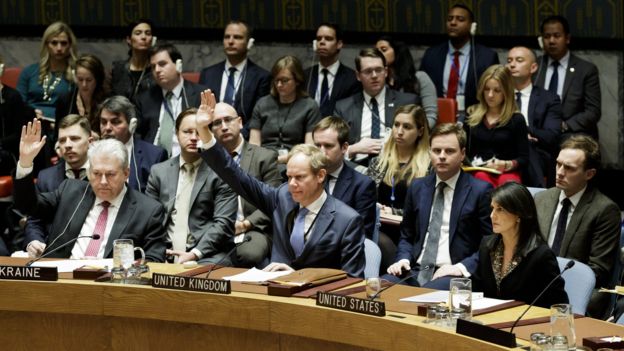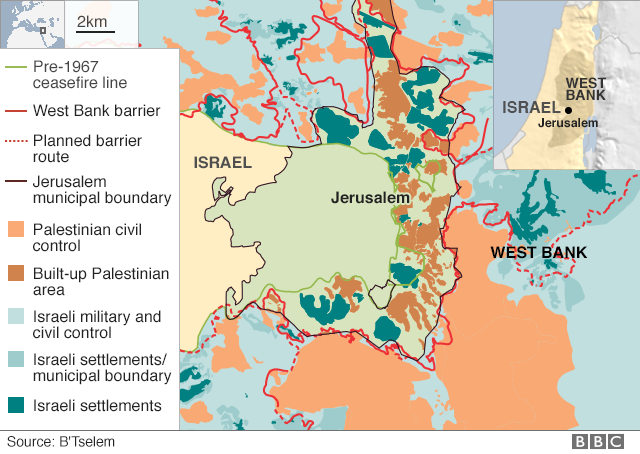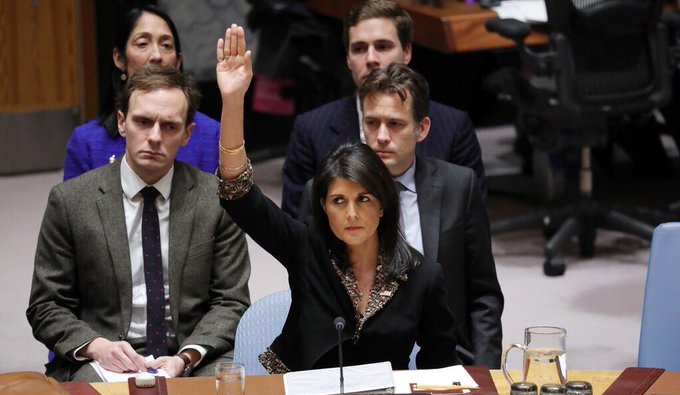
US President Donald Trump has threatened to cut off financial aid to countries that back a United Nations resolution opposing the recognition of Jerusalem as Israel's capital.
Earlier this month, Mr Trump took that step amid international criticism.
"They take hundreds of millions of dollars and even billions of dollars, and then they vote against us," he told reporters at the White House.
"Let them vote against us. We'll save a lot. We don't care."
His comments come ahead of a UN General Assembly vote on a resolution opposing any recognition of Jerusalem as Israel's capital.
The draft resolution does not mention the US, but says any decisions on Jerusalem should be cancelled.
Earlier, US ambassador to the UN Nikki Haley warned member states that President Trump had asked her to report on "who voted against us" on Thursday.

Analysis
By Nada Tawfik, BBC News, New York
President Trump and Ambassador Haley are trying to use American muscle rather than diplomacy to convince countries to vote their way. From Washington's perspective, recognising Jerusalem as Israel's capital and deciding to move its embassy there is its sovereign right.
But that's not how the majority of countries at the United Nations see it.
The strongest repudiation came, unsurprisingly, from Washington's critics.
Meanwhile, many US allies are brushing off the tough rhetoric as an empty threat.
A senior diplomat told me it was clear that the Trump administration was determined to take a stand for Israel at the UN, but he doubted that Washington would cut aid to, say, Egypt - which sponsored the failed Security Council measure on which the General Assembly draft resolution is based.
What is certain is that the US will be isolated in the General Assembly on Thursday as the rest of the world once again tells President Trump that it does not agree with his decision on Jerusalem.

The status of Jerusalem goes to the heart of the Israeli-Palestinian conflict.
Israel occupied the east of the city, previously occupied by Jordan, in the 1967 Middle East war and regards the entire city as its indivisible capital.
The Palestinians claim East Jerusalem as the capital of a future state and its final status is meant to be discussed in the latter stages of peace talks.
Israeli sovereignty over Jerusalem has never been recognised internationally, and all countries currently maintain their embassies in Tel Aviv. However, President Trump has told the US state department to start work on moving the US embassy.
The 193-member UN General Assembly will hold a rare emergency special session on Thursday at the request of Arab and Muslim states, who condemned Mr Trump's decision to reverse decades of US policy earlier this month.
The Palestinians called for the meeting after the US vetoed a Security Council resolution, which affirmed that any decisions on the status of Jerusalem were "null and void and must be rescinded", and urged all states to "refrain from the establishment of diplomatic missions in the holy city".

The other 14 members of the Security Council voted in favour of the draft, but Ms Haley described it as an "insult".
The non-binding resolution put forward by Turkey and Yemen for the General Assembly vote mirrors the vetoed Security Council draft.
The Palestinian permanent observer at the UN, Riyad Mansour, said he hoped there would be "overwhelming support" for the resolution.
But on Tuesday, Ms Haley warned in a letter to dozens of member states that encouraged them to "know that the president and the US take this vote personally".
"The president will be watching this vote carefully and has requested I report back on those countries who voted against us. We will take note of each and every vote on this issue," she wrote, according to journalists who were shown the letter.
"The president's announcement does not affect final status negotiations in any way, including the specific boundaries of Israeli sovereignty in Jerusalem," she added. "The president also made sure to support the status quo of Jerusalem's holy sites."
Ms Haley echoed the warning on Twitter, writing: "The US will be taking names."
Palestinian Foreign Minister Riyad al-Maliki and his Turkish counterpart, Mevlut Cavusoglu, accused the US of intimidation.
"We see that the United States, which was left alone, is now resorting to threats. No honourable, dignified country would bow down to this pressure," Mr Cavusoglu told a joint news conference in Ankara on Wednesday before travelling to New York.
Source:
BBCNews


No comments:
Post a Comment
Add a Comment...